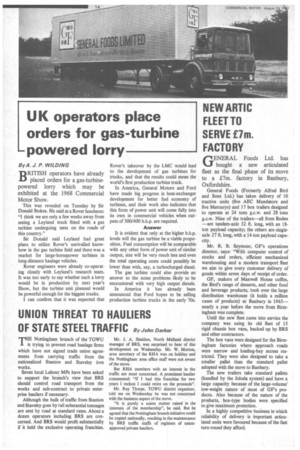NEW ARTIC FLEET TO SERVE Om.
Page 16

If you've noticed an error in this article please click here to report it so we can fix it.
FACTORY
GENERAL Foods Ltd. has bought a new articulated fleet as the final phase of its move to a Elm. factory in Banbury, Oxfordshire.
General Foods (Formerly Alfred Bird and Sons Ltd.) has taken delivery of 10 tractive units (five AEC Mandators and five Mercurys) and 17 box trailers designed to operate at 24 tons g.c.w. and 28 tons g.c.w. Nine of the trailers—all from Baden —are tandem-axle 32 ft. long, with an 18ton payload capacity; the others are singleaxle 27 ft. long, with a 14-ton payload capacity.
Mr. R. B. Seymour, GF's operations director, says: "With computer control of stocks and orders, efficient mechanized warehousing and a modern transport fleet we aim to give every customer delivery of goods within seven days of receipt of order.
OF, makers of Maxwell House coffee, the Bird's range of desserts, and other food and beverage products, took over the large distribution warehouse (it holds a million cases of products) at Banbury in 1965— nearly a year before the move from Birmingham was complete.
Until the new fleet came into service the company was using its old fleet of 15 rigid chassis box vans, backed up by BRS and other contractors.
The box vans were designed for the Birmingham factories where approach roads were narrow and loading-bay access restricted. They were also designed to take a smaller pallet than the standard pallet adopted with the move to Banbury.
The new trailers take standard pallets (handled by the Joloda system) and have a large capacity because of the large-volume/ low-weight nature of most of GF's products. Also because of the nature of the products, box-type bodies were specified to give maximum protection.
In a highly competitive business in which reliability of delivery is important articulated units were favoured because of the fast turn-round they afford.












































































































